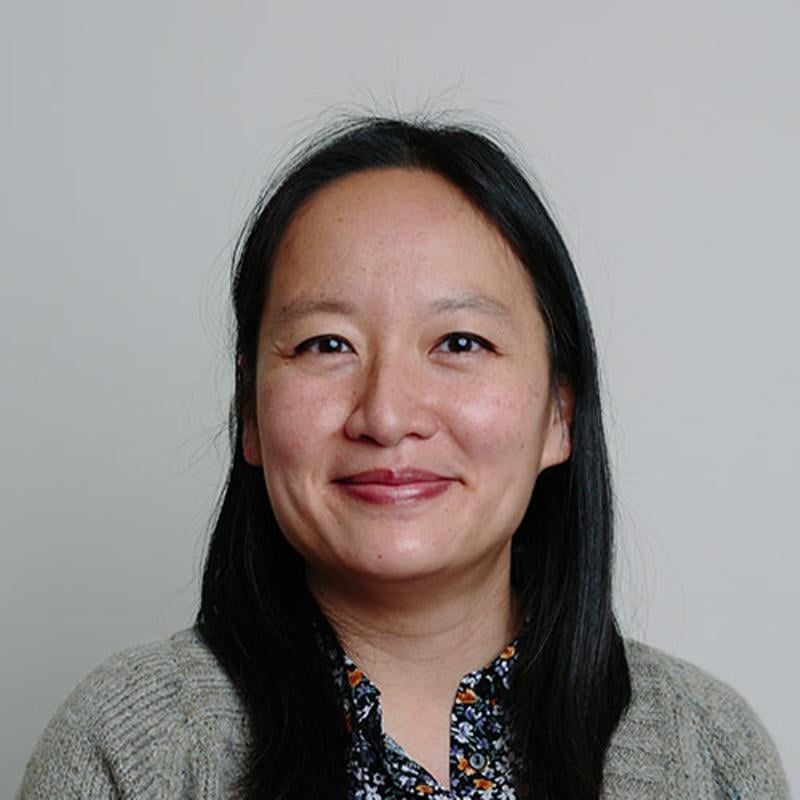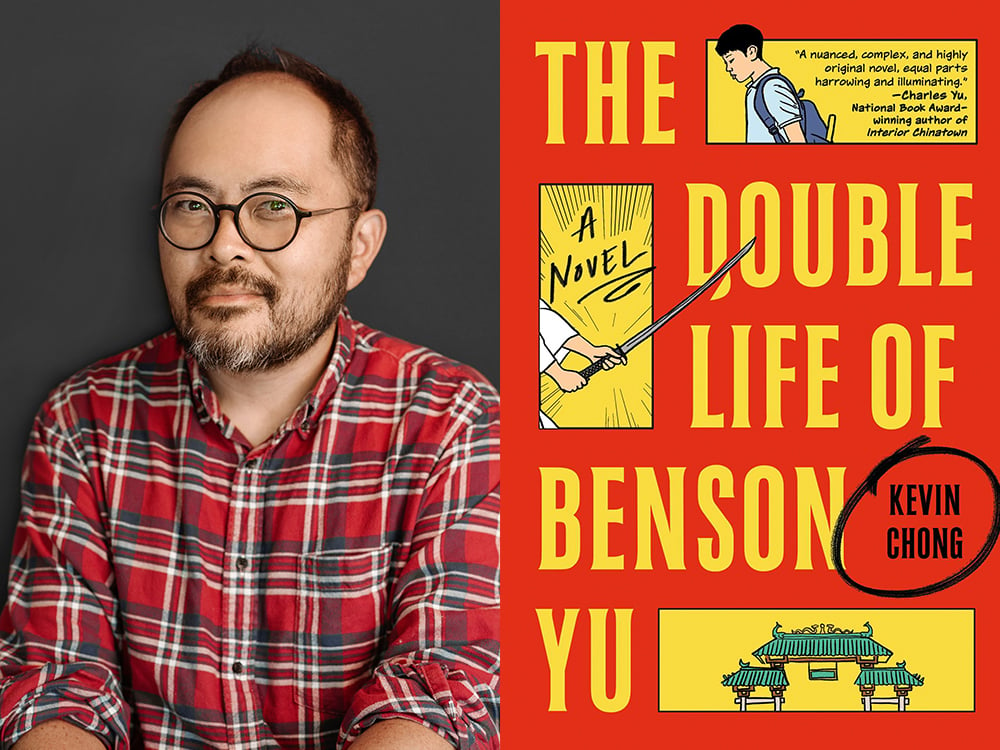Family makes us and breaks us. It’s the site of our earliest relationships and, for many, a space of complicated love and lifelong struggle.
In a new novel by Vancouver author, creative writing professor and long-time Tyee contributor Kevin Chong, the unravelling of a Chinese-Canadian family sets the stage for a big-hearted exploration of parenthood, friendship and caregiving. This work of metafiction (fiction written from the perspective of a fictive narrator who is both author of the story and driver of the plot) takes unexpected turns while holding up a mirror to how we live now.
The Double Life of Benson Yu, narrated by a middle-aged protagonist who shares some of the author’s traits, follows 12-year-old Benson Yu, who lives in a studio apartment in 1980s Chinatown with his grandmother. His life is turned upside down when his grandmother is hospitalized and he is left alone.
The novel’s gripping twists are conveyed with a tenderness informed by a close, compassionate observation of the quiet agonies of middle age, the lasting impacts of abuse and the ongoing tension of navigating white spaces as a racialized person.
As with other new works of fiction published in 2023, the novel is shaped by the author’s experiences of the early pandemic.
“I think I used [the manuscript] as a coping mechanism during lockdown when my family and I were all together housebound. Perhaps the characters are a little more obsessive, more desire to control what they can control, because of COVID-19,” Chong tells me.
The novel was also informed by the death of Chong’s grandmother, who passed away in November 2019, a few months before the pandemic took hold. “My grandmother would take a bus from Strathcona every weekday to look after my brother and me when our family lived in Ladner. I felt very close to her,” he remembers. “For about 20 years she lived in Chinatown on Hastings Street a few blocks east of Main, at the edge of the Downtown Eastside, until she needed to move to a nursing home in 2010.”
Chong’s detailed renderings of Chinatown contrast sharply with the world outside it. This dissonance lays the foundation for a sustained ache of longing throughout The Double Life of Benson Yu. In addition to Chong’s astute reflections on the complexity of Asian identity, the book is an important exploration of grief and rage, and how one shapes the other.
The Tyee caught up with Chong about his book on the eve of its April 18 release. This interview has been edited for length and clarity.
The Tyee: The book is full of so many interesting reflections on family and what it takes to take care of the people around us. Can you tell me about what spurred some of those reflections?
Kevin Chong: There’s an emotional repression about being in an Asian family that I wanted to explore. I think a lot of Asian-Canadian families have family members that went through a lot — poverty, political unrest. And then they come to Canada, where they have to start from zero.
This affects their attitude toward parenting, and the amount of time they have for it. They express love through scolding and criticism, and feeding — and in my case, commenting about how overweight I was because of all the food they pushed me to finish.
In an Asian family, I always felt I needed to bottle up any feeling, that that was how I needed to behave and be low maintenance to be considered a good child.
I have learned that when you push things inside, they come out of you in unexpected and uncontrollable ways.
When you were writing this book, what did you make of the possibility that readers might assume that some of the events of the novel come from your own life, whether true or not?
Some were, though; some weren’t! I think I started with a character who is roughly the same age as me, with some of my autobiographical characteristics. I think that given what happens to both versions of Benson Yu — the metafiction and the violence — might suggest he’s not me entirely.
One thing that’s emotionally true is that I have been in situations where I staunchly defended people who were, in fact, undermining and hurting me. But my identity was tied up in my needing them to be my protector. I’ve seen that dynamic play out with other people in my life, and it was something I wanted to explore.
There’s always a tendency to determine how much of the author’s autobiography is in the work of fiction (and to try to guess how they’re stretching the truth in non-fiction). I’m okay with people making their assumptions.
I loved your renderings of Benson Yu's Chinatown. Can you tell me about your connections to Vancouver's Chinatown, and what your hopes were for its role in the novel?
In my book, I never specify which Chinatown Benson lives in, but in my head it was Vancouver.
My mom’s paternal grandfather paid the Head Tax and is buried in Mountain View Cemetery. According to family lore, he owned a hotel on East Cordova Street that had belonged to a Japanese person; that person lost it during the Second World War. My great-grandfather’s son was like a Chinese version of a remittance man who had lived comfortably until he died in a traffic accident when my mother was an infant.
For three decades, my father managed Vancouver’s first care home for elderly Chinese and, as I’ve mentioned, my grandmother lived in Chinatown for many years — her last few years in that nursing home my dad managed. I would stay with her for summers when my parents worked or went back to Hong Kong. When I was 12 and my family was moving from Ladner into the city, we spent the summer in my grandmother’s studio apartment, the one Benny lives in, while the house was being renovated. My grandmother stayed with a friend and would come over during the day when my parents went to work. It was a long, dull summer. All we did was play mahjong, watch TV and occasionally go to the library.
For the most part, Chinatown was a place my parents, who came a little earlier than the wave of Hong Kongers who arrived in the 1980s and 1990s, avoided. They did most of their eating and socializing in Richmond. However, I remember seeing movies at the Golden Harvest on Main Street as a highlight, and seeing John Woo’s A Better Tomorrow there was just as amazing as going to a Star Wars movie.
I tried to write Chinatown based on my own memory of that place as a child, so I would know it from the street level, but I wouldn’t write about, say, the fraternal organizations that I knew nothing about as a child. I wanted to create a place that Benny feels sheltered in, to the point that the world outside is unbelievably foreign. He doesn’t feel out of place or racialized until he leaves. For his alter ego, Chinatown is a place that he’s been trying to transcend his whole adult life — for adult Benson, it’s an insular, closed-off world and he blames it for the hurt he felt there as a child.
As an adult, Vancouver’s Chinatown represents a space of resilience and survival and it’s currently a place that’s dealing with a lot of precarity. It’s actually a place I visit fairly frequently. I eat there, visit Massy Books, and play pickup soccer at Andy Livingstone park, which is found right next to Sun Yat-Sen Classical Chinese Garden.
What is the role of fiction? What draws you to it?
For me, fiction extracts, expands and clarifies experience. I love talking about it, whether it’s when I’m teaching or promoting a book, and I still feel I am learning something new with each book, and that each book feels daunting in new ways. I’m drawn to the act of writing a book, which I find deeply transporting, vexing and fulfilling.
And I’m drawn to the opportunity to repurpose my experiences as a person in the world and as a reader in a prose narrative in the chance that an audience of readers can connect to it.
Kevin Chong is launching ‘The Double Life of Benson Yu’ with fellow author Lindsay Wong at a reading at the Chinatown Storytelling Centre on April 26. Chong will also be in conversation with author JJ Lee as part of the Vancouver Public Library’s ‘Uplift Asian’ series on May 10 at the VPL downtown. ![]()
Read more: Books, Rights + Justice

















Tyee Commenting Guidelines
Comments that violate guidelines risk being deleted, and violations may result in a temporary or permanent user ban. Maintain the spirit of good conversation to stay in the discussion and be patient with moderators. Comments are reviewed regularly but not in real time.
Do:
Do not: